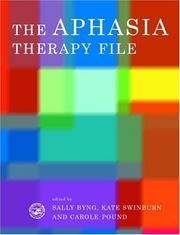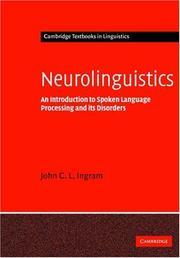| Listing 1 - 5 of 5 |
Sort by
|
Dissertation
ISSN: 03466248 Year: 2007 Volume: 33 Publisher: Göteborg : Department of Linguistics, Göteborg University,
Abstract | Keywords | Export | Availability | Bookmark
 Loading...
Loading...Choose an application
- Reference Manager
- EndNote
- RefWorks (Direct export to RefWorks)
Aphasia --- Aphasie --- Treatment --- Traitement
Book
ISBN: 1281105449 9786611105440 184642626X 1435602684 Year: 2007 Publisher: London : Jessica Kingsley,
Abstract | Keywords | Export | Availability | Bookmark
 Loading...
Loading...Choose an application
- Reference Manager
- EndNote
- RefWorks (Direct export to RefWorks)
Reviews of the first edition:. 'A triumph … a classic in the same way that Oliver Sacks's Awakenings is.'. - Michael Frayn. 'Sheila Hale's book enlarges the language of love.'. - Brenda Maddox. 'One of the most remarkable additions to the literature of illness in our time.'. - Robert McCrum, The Times. 'A luminous biographical memoir and an enthralling testament of love... No one can help wondering what surprises the next heartbeat may bring. Sheila Hale's acute and compassionate book makes the unknown country seem a little less desolate.'. - The Independent. 'A moving insight into the
Aphasic persons --- Aphasia. --- Cerebrovascular disease --- Patients --- Hale, J. R. --- Health.
Book
ISBN: 159756835X 9781597568357 9781597561624 1597561622 Year: 2007 Publisher: San Diego (Cal.) Plural Publishing
Abstract | Keywords | Export | Availability | Bookmark
 Loading...
Loading...Choose an application
- Reference Manager
- EndNote
- RefWorks (Direct export to RefWorks)
As a consequence of the disability movement, the thinking generated by the World Health Organization's classification of disability and functioning, and an upturn in concern for the long-term consequences of aphasia, it has become apparent that two distinctive pathways for the treatment of aphasia have emerged over the past decade. The first (and most traditional) involves assessment and management directed toward lessening the effects of the impairment of aphasia, while the second pathway focuses less on specific language than on the psychosocial consequences of aphasia. This unique text specifically contrasts impairment- and consequences-focused treatment with the aim of providing clinicians with a level playing field that permits them to evaluate for themselves the relative contributions that each approach provides, to evaluate their relative strengths and weaknesses, and finally to seek common ground. An opening chapter sets the scene, while the heart of the book, based on real cases, concerns five meticulously described, yet hypothetical individuals with aphasia. In each of the cases, detailed descriptions and assessment results are provided and clinical management plans, representing each approach, are presented internationally by recognized expert clinicians.
Aphasic persons --- Aphasia --- Aphasiacs --- Aphasics --- People with disabilities --- Rehabilitation --- Patients --- Afasie

ISBN: 1135471681 1280402369 9786610402366 0203193555 9780203193556 9780863775666 0863775667 0203226364 9780203226360 9781135471682 9781135471637 1135471630 9781135471675 1135471673 9780863775673 0863775675 0863775667 9781841692708 9780203490839 9781135426538 9781135426484 9781135426521 9781138006058 Year: 2007 Publisher: Hove Psychology Press
Abstract | Keywords | Export | Availability | Bookmark
 Loading...
Loading...Choose an application
- Reference Manager
- EndNote
- RefWorks (Direct export to RefWorks)
Different from a textbook or academic journal, the File represents a collection of explicit descriptions about therapy interventions written by practitioners themselves. The description of the rationale for the therapy, the intervention itself and evaluation of outcomes are of paramount importance. Each contributor guides the reader through the thinking that they engaged in as they decided what to do, often with considerable frankness about the difficulties involved. The File will be of equal value to experienced practitioners and students alike.
Aphasia --- Aphasic persons --- Speech therapy --- Aphasiacs --- Aphasics --- People with disabilities --- Brain --- Language disorders --- Speech disorders --- Treatment --- Rehabilitation --- Patients --- Diseases --- #KVHB:Afasie --- Afasie --- Therapie --- Orthopedagogics --- spraaktechnologie --- spraakstoornissen --- afasie --- spreken

ISBN: 9780521796408 9780521791908 0521791901 0521796407 9780511618963 0511354398 9780511354397 0511353812 9780511353819 9780511649219 0511649215 0511618964 1107174201 1282389696 9786612389696 0511645120 051155723X Year: 2007 Publisher: Cambridge: Cambridge university press,
Abstract | Keywords | Export | Availability | Bookmark
 Loading...
Loading...Choose an application
- Reference Manager
- EndNote
- RefWorks (Direct export to RefWorks)
What biological factors make human communication possible? How do we process and understand language? How does brain damage affect these mechanisms, and what can this tell us about how language is organized in the brain? The field of neurolinguistics seeks to answer these questions, which are crucial to linguistics, psychology and speech pathology alike. This textbook, first published in 2007, introduces the central topics in neurolinguistics: speech recognition, word and sentence structure, meaning, and discourse - in both 'normal' speakers and those with language disorders. It moves on to provide a balanced discussion of key areas of debate such as modularity and the 'language areas' of the brain, 'connectionist' versus 'symbolic' modelling of language processing, and the nature of linguistic and mental representations. Making accessible over half a century of scientific and linguistic research, and containing extensive study questions, it will be welcomed by all those interested in the relationship between language and the brain.
Neurolinguistics --- Speech perception --- Aphasia --- Human information processing --- Etiolog --- 800 --- 800 Taalwetenschap. Taalkunde. Linguistiek --- Taalwetenschap. Taalkunde. Linguistiek --- Speech recognition --- Auditory perception --- Psycholinguistics --- Speech --- Neuro-linguistics --- Biolinguistics --- Higher nervous activity --- Neuropsychology --- Information processing, Human --- Bionics --- Information theory in psychology --- Perception --- Brain --- Language disorders --- Speech disorders --- Etiology --- Diseases --- Pragmatics --- Neurolinguistics. --- Speech perception. --- Human information processing. --- Etiology. --- Neurolinguistique --- Perception de la parole --- Aphasie --- Information, Traitement de l', chez l'homme --- Etiologie --- Psycholinguistics. --- Language, Psychology of --- Language and languages --- Psychology of language --- Linguistics --- Psychology --- Thought and thinking --- Psychological aspects --- Arts and Humanities --- Language & Linguistics --- Aphasia - Etiology --- Aphasia - Etiolog --- Langage --- Processus cognitif --- Audition --- trouble --- Neurolinguistique.
| Listing 1 - 5 of 5 |
Sort by
|

 Search
Search Feedback
Feedback About UniCat
About UniCat  Help
Help News
News